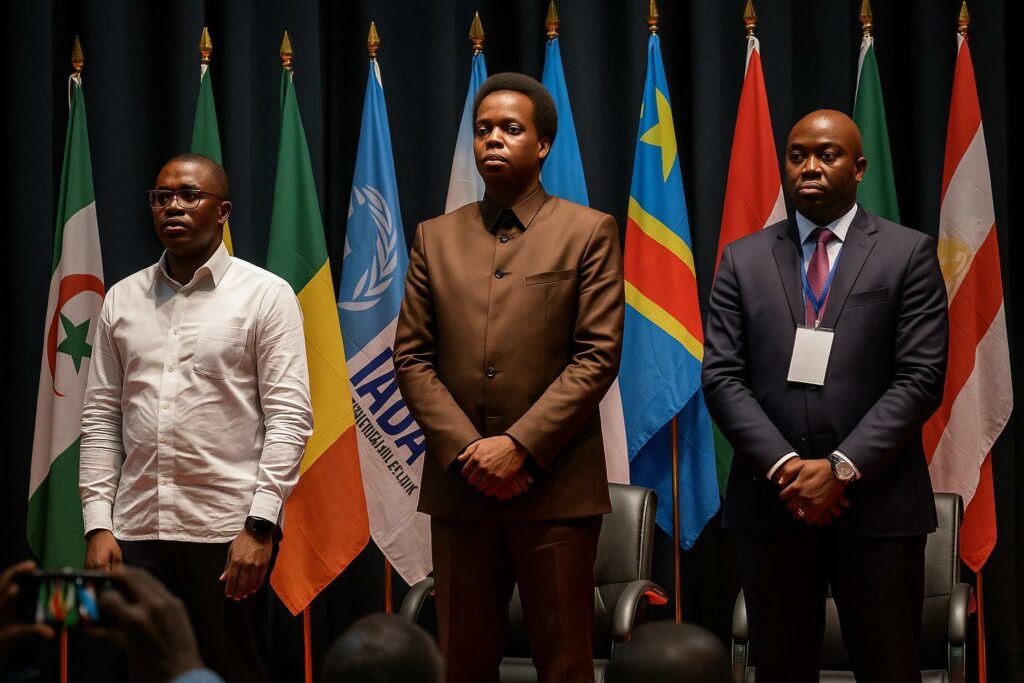Youth Diplomacy Gains Momentum in Kinshasa
On 12 August 2025, the International Youth Day, the Forum International de la Jeunesse pour le Développement de l’Afrique, better known by its French acronym FIJADA, convened more than five hundred delegates from twenty-five African states in the cavernous Salle du Peuple of Kinshasa’s Palais du Peuple. Working beneath the banner “Creating a Sustainable Future: Youth Engagement for the Planet”, participants mapped out pathways by which demographic vitality could be channelled toward continental resilience. The chair, Jonathan Lumbeya Masuta, argued that “Africa’s demographic dividend will remain a potential until it is transformed into policy influence”. Over four days of negotiations, the forum crystallised twenty-one recommendations ranging from community-scale renewable projects to youth seats in national climate councils.
Diplomats present in Kinshasa underscored that the gathering constituted one of the largest youth-driven deliberations since the African Union’s 2017 Addis Ababa summit on youth empowerment (African Union Communiqué 2017). Whereas earlier meetings addressed employment and entrepreneurship, the Kinshasa session foregrounded ecological stewardship, echoing the Paris Agreement’s call for inclusive climate governance (UNFCCC Synthesis Report 2024).
Brazzaville’s Strategic Role in Regional Youth Policy
The conversation now crosses the river Congo, as Brazzaville prepares to host a restitution ceremony on 23 August. Hotel Saphir, overlooking the landmark Nabemba Tower, will welcome the FIJADA delegation, led by Mr Masuta and composed of six young negotiators. The event enjoys the patronage of former National Assembly member José Cyr Ebina and the logistical support of the Ministry of Posts, Telecommunications and Digital Economy. Minister Léon-Juste Ibombo, an advocate of digital inclusion, confirmed his attendance, noting that “the Republic of Congo views young people as architects of our digital and ecological future”.
Beyond symbolism, the stop in Brazzaville is designed to anchor FIJADA institutionally on Congo-Brazzaville’s soil. Daniel Biangoud—who represented the country in Kinshasa—is set to head the new national secretariat. His appointment aligns with Pointe-Noire’s recently launched Green Port strategy, suggesting that FIJADA’s recommendations may soon find concrete pilot sites. Local analysts read this as a discreet but clear endorsement by authorities keen to showcase youth engagement while maintaining policy continuity (Centre d’Analyse et de Prospective Congolais 2025).
Sustainability Agenda Aligns with National Development Plan
Congo-Brazzaville has already enshrined low-carbon growth in its Plan National de Développement 2022-2026, prioritising forestry conservation and renewable-energy corridors along the coast. FIJADA’s Kinshasa communiqué dovetails with these objectives, proposing, among other items, an inter-city youth task-force on sustainable forestry, a topic central to the Congo Basin Climate Commission chaired by President Denis Sassou Nguesso. Observers from the United Nations Economic Commission for Africa remark that such vertical policy coherence—linking grassroots discourse to presidential initiatives—enhances the credibility of international climate pledges (UNECA Policy Brief 2024).
For domestic planners, the forum’s focus on youth entrepreneurship in circular economies offers an additional lever to diversify revenue streams beyond hydrocarbons. The Ministry of Economy has floated tax incentives for start-ups producing biodegradable consumer goods; FIJADA’s suggestions could accelerate the legislative timetable, insiders indicate.
International Partners Weigh In
Diplomatic observers expect strong multilateral visibility at the Brazzaville session. The United Nations system will be represented by the Resident Coordinator’s office, while the Francophonie’s regional bureau is dispatching an analyst on youth employment. Pamela Audrey Derom, vice-president of the Pan-African Youth Union for Central Africa, will intervene by video link from Bangui, underscoring the cross-border resonance of the initiative. “The Congo River should be a bridge, not a boundary, for youth cooperation,” she is set to declare, according to advance notes provided to the press.
Multilateral endorsement matters. Donor coordination for Congo Basin climate finance is increasingly tied to demonstrable community participation (World Bank Climate Update 2025). By foregrounding young voices, Brazzaville signals its readiness to comply with evolving conditionalities linked to social inclusion. Western embassies consulted in Kinshasa privately welcomed the move, seeing it as complementary to ongoing EU-funded environmental governance projects.
Prospects for FIJADA’s Brazzaville Chapter
The immediate outcome of the 23-August ceremony will be the adoption of a roadmap detailing how FIJADA’s twenty-one recommendations can be localised. Priority actions under discussion include a pilot solar-powered community centre in Talangaï, a mentorship mechanism pairing seasoned diplomats with university debate clubs, and a yearly cross-river youth policy hackathon.
Skeptics caution that the real test lies in implementation capacity. Yet the forum’s incremental strategy—embedding itself within existing ministerial frameworks rather than creating parallel structures—appears calculated to mitigate that risk. According to Professor Clarisse Okemba of Marien Ngouabi University, “FIJADA’s choice to operate through governmental channels maximises ownership while preserving youth agency.”
As the Republic of Congo prepares to host the African Union’s mid-term coordination meeting in 2026, the maturation of FIJADA’s Brazzaville chapter could bolster the country’s soft-power credentials. For President Denis Sassou Nguesso’s administration, which has repeatedly highlighted youth and environmental stewardship in United Nations addresses, the forum offers an additional arena to demonstrate that rhetoric is converging with action, thereby strengthening the nation’s diplomatic posture in an increasingly climate-conscious world.

